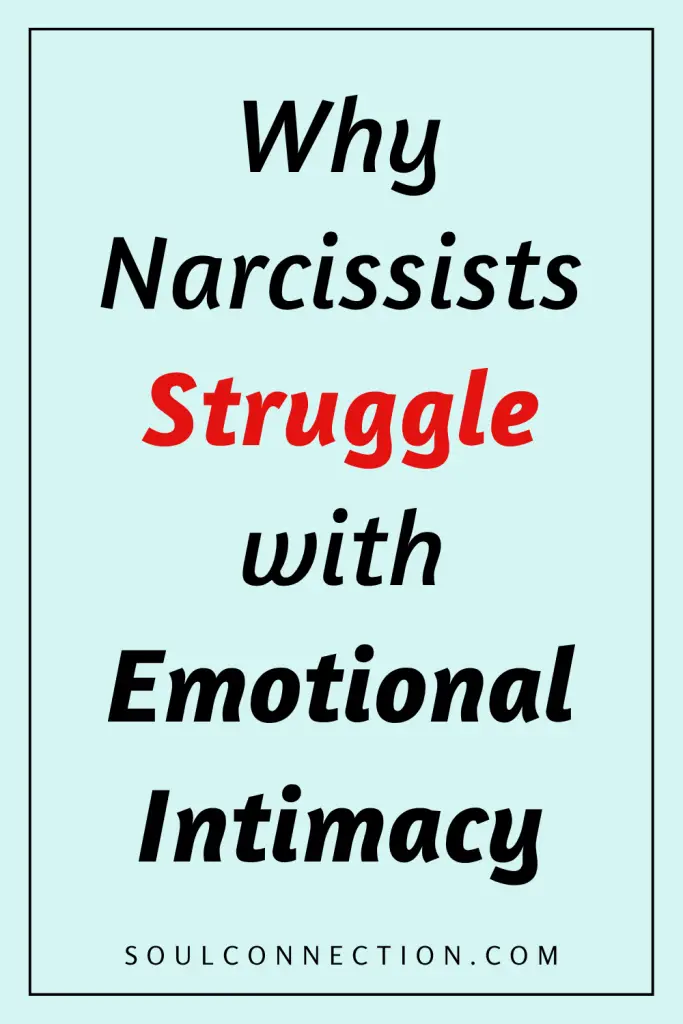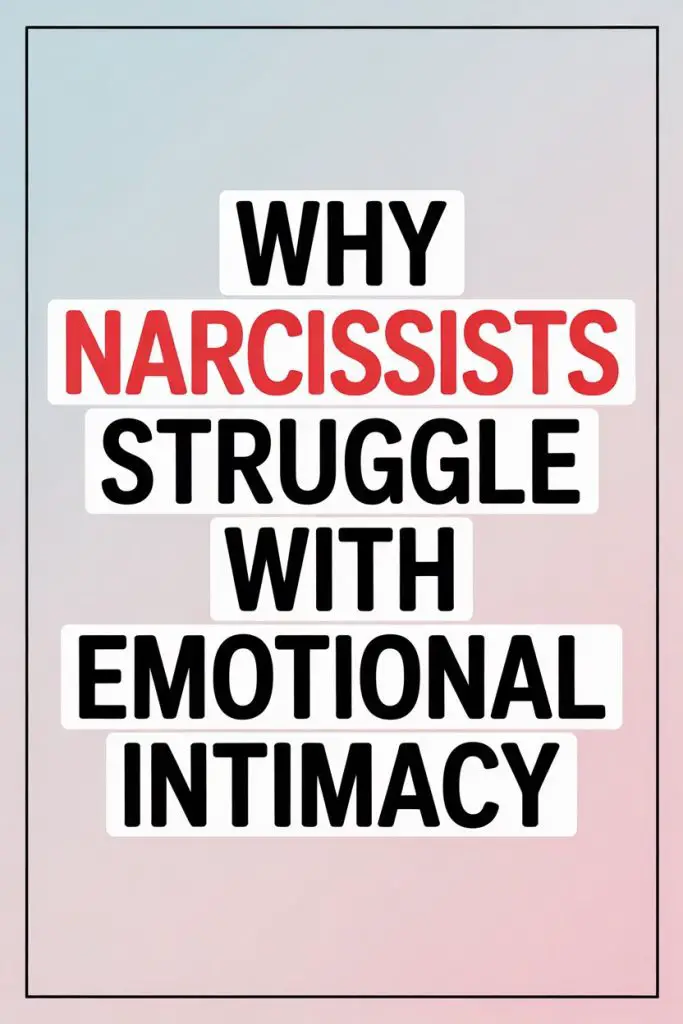Emotional intimacy sounds dreamy on paper—hours-long chats, soul-gazing, shared snacks and secrets. Now enter the narcissist, with their dazzling confidence and charm, and brace yourself for a bumpy ride.
Pull up a chair, and let’s unravel why emotional closeness feels like an Olympic sport to the narcissist (hint: it’s not a lack of scented candles).
The Great Wall of Narcissism
Emotional intimacy thrives on vulnerability—two people opening up, showing their messiest bits, and trusting that they won’t get stomped on. For narcissists, vulnerability is about as appealing as a cold shower in January.
Why? Deep down, narcissists often carry a heavy suitcase of shame and insecurity. That swagger? It’s armor.
They worry that if anyone peeks behind the mask, the whole charade topples.
Instead of letting anyone get close, they build a fortress of grandiosity, criticism, and control. This keeps partners out—but also locks the narcissist in.
As a result, real closeness gets replaced by power games and emotional smoke-and-mirrors.
Empathy on Mute
Emotional intimacy is a two-way street. One partner shares a fear, the other offers comfort. It’s a back-and-forth, not a lecture series.
Narcissists, though, often struggle to tune in to anyone else’s feelings. They might nod or throw out the right words—but the empathy switch is set to “barely working.”
Instead of genuinely connecting, they’re busy calculating how the conversation affects them.
If you’ve ever shared something vulnerable and gotten a blank stare or a quick pivot to their latest achievement, you’ve seen this in action.
Without empathy, emotional intimacy ends up lopsided—like playing tennis with someone who only returns the ball when they’re in the mood.
The Fear of the Mirror
Emotional intimacy often means seeing ourselves reflected in our partner’s eyes: the good, the bad, the “I can’t believe I just said that.” This kind of reflection can be exhilarating—or, if you’re a narcissist, downright terrifying.
A narcissist’s self-image is fragile, even if they come across as bulletproof. Getting close means risking exposure of the cracks they desperately want to hide.
Every disagreement or honest feedback from a partner feels like an attack, not an opportunity for growth.
No wonder they shy away from deep emotional sharing. Who wants to risk seeing something they don’t like, especially if they’ve spent decades crafting a spotless persona?
Control Issues Galore
Intimacy requires a certain amount of letting go. It’s about sharing space, feelings, and sometimes the TV remote. Narcissists, on the other hand, love to call the shots.
Getting close means ceding control, admitting needs, and risking disappointment—all things that are about as comfortable for them as sitting on a cactus.
They often avoid situations where their partner might have the upper hand emotionally.
If you’ve ever wondered why a narcissistic partner picks fights when things are going well or sabotages moments of closeness, you’re not imagining things. Keeping emotional distance lets them stay in control—at least in their own minds.
The Transactional Trap
In healthy relationships, giving and receiving love is less about keeping score and more about generosity.
With narcissists, relationships often become transactional: “I’ll show affection if you praise me,” or “I’ll listen to your story if you listen to my rant about work.”
This quid-pro-quo approach makes deep intimacy nearly impossible. When love comes with conditions and performance reviews, partners end up walking on eggshells rather than sinking into trust.
Intimacy flourishes in environments of safety and selflessness—not in emotional marketplaces where everything has a price tag.
The Myth of “Specialness”
Narcissists are convinced they’re special—unique, misunderstood, a cut above the rest. While this might sound like a confidence booster, it actually keeps them at arm’s length from others.
Why bother with messy vulnerability when you’re convinced nobody will truly understand you? The myth of specialness becomes a wall, not a bridge.
Narcissists may crave admiration, but genuine connection feels beneath them—or, worse, threatening to their “one-of-a-kind” status.
If you ever felt like your efforts to connect emotionally rolled off your partner like water off a duck’s back, their need for uniqueness could be the culprit.
Shame and Self-Loathing Underneath
One of narcissism’s best-kept secrets: All that bravado often hides deep feelings of shame or inadequacy. It’s exhausting to keep up a flawless image, but the alternative—admitting shortcomings—feels unbearable.
Allowing someone behind the curtain means risking their disgust or rejection. For many narcissists, the internal monologue goes something like: “If you really knew me, you’d run for the hills.”
Why bother with deep intimacy when it’s safer to keep things superficial? Better to impress than to be known, right?
Communication Breakdowns
Deep intimacy requires honest, open communication. Narcissists, on the other hand, are expert deflectors. They change the subject, minimize your feelings, or turn every conversation into a monologue about their own woes.
Trying to have a heart-to-heart with a narcissist can feel like arguing with a brick wall—except the wall occasionally fights back. Partners often leave these exchanges feeling confused, unheard, or even gaslit.
That’s not fertile ground for intimacy; it’s an emotional minefield.
The Allure of the Chase, Not the Commitment
Narcissists are often magnetic at the start—a whirlwind of attention and flattery. They’re ace seducers, relishing the thrill of the chase.
But once the excitement wears off and the relationship requires real emotional investment, things start to unravel.
To them, the early stages of romance are like a game. Deep, consistent emotional intimacy? That’s work. No wonder things get chilly once the honeymoon phase fades.
What Can Partners Do?
Trying to build emotional intimacy with a narcissist can feel like building a sandcastle at high tide—no matter how beautiful it is, the waves keep knocking it down.
Still, it’s not all doom and gloom. Some practical steps can help:
- Set Boundaries: Protect your own emotional health. It’s okay to expect respect and support.
- Communicate Clearly: Stick to “I” statements and avoid getting sucked into blame-games.
- Seek Outside Support: A trusted friend or therapist can help you maintain perspective.
- Don’t Take It Personally: Their intimacy struggles are about their own wounds, not your worth.
- Model Vulnerability: While you can’t force them to open up, you can show what safe, honest sharing looks like.
Healing Isn’t a Solo Act
Change is possible, but it’s not something you can make happen by sheer force of will. Narcissists rarely wake up and decide, “Today, I’ll be emotionally available!” Many need professional help, and even then, progress can be slow.
If you’re hoping for transformation, manage your expectations—and keep your self-respect front and center.
When Love Isn’t Enough
No amount of patience or love can “fix” someone’s inability to connect emotionally if they’re not willing to do the work. Sometimes, the bravest thing is to accept reality and seek the intimacy you deserve elsewhere.
It’s not giving up. It’s refusing to settle for crumbs when you want—and need—the whole cake.
Rewriting Your Story
Emotional intimacy isn’t just for the lucky few. It’s a birthright, not a luxury. If your relationship feels emotionally starved, don’t blame yourself.
Narcissism is a tough nut to crack, and emotional closeness can be a real stumbling block for even the most charming narcissist.
Give yourself permission to want more. Whether you stay, seek change, or move on, keep reaching for the kind of connection that feels nourishing, honest, and mutual.
You’re not asking for too much. You’re asking for what’s real.


